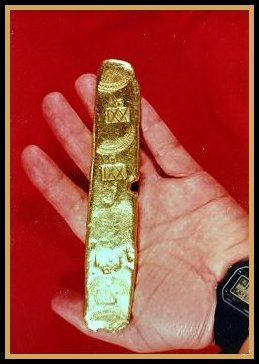 Diving from the salvage vessel Southwind in September of 1974, diver Hank Spinney recovered the EN RADA bar in the “quicksands” area near the Marquesas Keys...with his bare hands, the first modern hands to touch the bar since it settled in repose 3-1/2 centuries earlier. What a thrill it was to him, and what a relief to Mel Fisher, his researchers, and his investors! Not only was this an exquisite artifact, but it was a direly-needed sign that Atocha lay nearby. As much a work of art (by virtue of its magnificent markings) as it is an ingot of gold bullion, the bar’s story unfolds as we examine each discrete stamping. In three locations along its length, the purity of metal (in karats) is indicated as 21-1/4 by the Roman numerals XXI plus a single dot. The dot represents one grano (grain) —four grains equaling a karat. A circular stamp is to be seen at five points on the bar, indicating that the “royal fifth” tax had been paid. If the ingot had to be used as currency before arriving in Spain, it could have been cut into smaller chunks, and each would have signified the purity of the bar and attested to the tax on it having been paid. About halfway along its length, the bocado—assayer’s bite—can be seen as a crescent gouge in the edge of the bar. This was the sample size which he assayed...and then kept as his fee!
|
